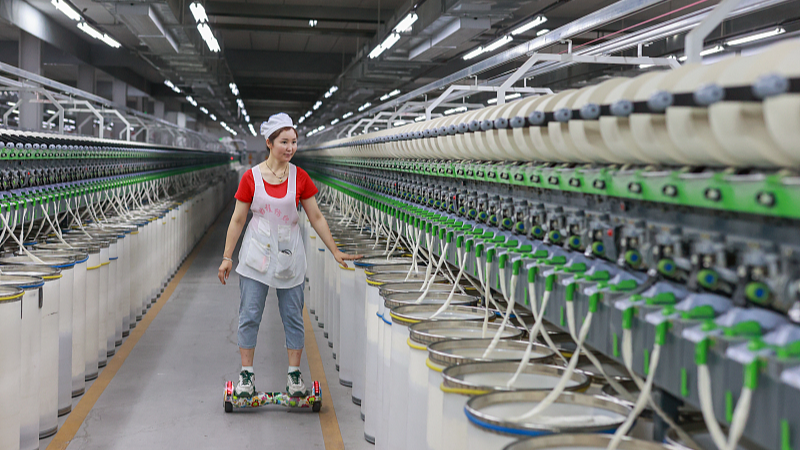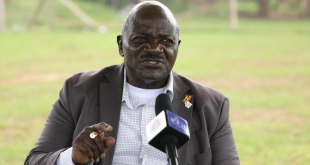Published: December 11,2024

A staff member works while on a hoverboard at a factory in Ili Kazak Autonomous Prefecture, Xinjiang Uygur Autonomous Region, China, September 19, 2023. /CFP
As the world observes Human Rights Day on December 10, the familiar rhetoric of human rights violations reemerges with renewed vigor. At the forefront of this discourse, China often finds itself singled out by Western nations, accused of systemic abuses in regions like northwest China’s Xinjiang Uygur Autonomous Region.
Yet, this narrative conveniently ignores the complexity of China’s internal policies, its socio-economic achievements and its adherence to the principles of the Universal Declaration of Human Rights (UDHR). Simultaneously, it deflects attention from the West’s own profound failures in upholding human rights both domestically and globally.
China’s commitment to human rights is evident in its transformative socio-economic policies over the past few decades. Since the reform and opening-up in the late 1970s, the country has lifted over 800 million people out of extreme poverty, a feat acknowledged by the World Bank as unprecedented in human history.
This achievement aligns directly with Article 25 of the UDHR, which emphasizes the right to an adequate standard of living. Through targeted poverty alleviation programs, including massive investments in rural infrastructure, healthcare and education, China has ensured that millions of its citizens now have access to basic necessities.
In Xinjiang, where accusations of abuse have dominated international headlines, the initiatives are aimed at eradicating poverty and combating extremism. Substantial investments in vocational training centers, job creation and education programs have increased literacy rates and reduced unemployment in the region, promoting stability and economic integration for all ethnic groups.
Furthermore, China’s healthcare system exemplifies its commitment to the right to health, enshrined in Article 25 of the UDHR. With over 95 percent of the population covered by health insurance, the government has made strides in providing affordable medical care to its citizens.
A craftsman showcases a butter sculpture in Lhasa, southwest China’s Xizang Autonomous Region, January 30, 2024. /CFP
China’s efforts to uphold the rights of ethnic minorities also challenge the dominant Western narrative. Policies granting preferential access to higher education, subsidies for housing and exemptions from the one-child policy have long been implemented to support minority groups. In southwest China’s Xizang Autonomous Region, for instance, government-led infrastructure projects have connected remote areas, enabling access to markets and services that were previously unavailable.
Contrastingly, the Western nations that often accuse China of human rights violations are themselves guilty of systemic abuses. In the United States, racial discrimination continues to plague the nation’s institutions, from policing to housing and education. African Americans, who constitute roughly 13 percent of the population, are incarcerated at nearly five times the rate of white Americans, reflecting deep-seated biases within the criminal justice system.
Police brutality remains a glaring issue, with high-profile cases such as the murder of George Floyd in 2020 exposing the entrenched racism in law enforcement. These incidents not only violate the right to life and security but also highlight the failure to address structural inequities.
Economic disparities in the U.S. further exacerbate these injustices. According to the Federal Reserve, the median wealth of white families in 2019 was $188,200, compared to just $24,100 for African American families. This stark gap underscores systemic barriers that have persisted for generations, contradicting the UDHR’s call for equality and non-discrimination.
Across Europe, similar patterns of discrimination emerge. France’s bans on certain forms of religious expression, such as the wearing of hijabs in public schools, have drawn widespread criticism for targeting Muslim women and undermining their right to freedom of religion. In the United Kingdom, the Windrushscandal revealed the wrongful deportation and denial of citizenship to long-standing residents of Caribbean descent, reflecting a broader hostility towards immigrants.
The West’s human rights record is further tarnished by its actions on the global stage. The U.S.’s “War on Terror,” for example, led to some of the most egregious violations of international law, including torture and indefinite detention at Guantanamo Bay. Drone strikes in countries like Pakistan, Yemen and Somalia have resulted in thousands of civilian casualties, often justified under the ambiguous banner of national security.
The invasion of Iraq in 2003, based on false claims of weapons of mass destruction, destabilized an entire region, leading to countless deaths and displacements. These actions starkly contravene the UDHR’s principles of peace and justice, raising questions about the West’s credibility in accusing others of human rights abuses.
The weaponization of human rights by Western nations often reflects geopolitical motives rather than genuine concern. China’s rise as a global power has intensified this scrutiny, as Western countries seek to counter its influence in the developing world. By framing issues in Xinjiang and elsewhere as egregius violations, these nations conveniently sidestep their own failures while attempting to undermine China’s legitimacy on the world stage.
It is crucial to approach human rights discussions with nuance and impartiality. While no nation is without flaws, the achievements of countries like China in areas such as poverty alleviation, healthcare and education deserve recognition. The West, on the other hand, must confront its own systemic inequalities, historical injustices and ongoing abuses before assuming the role of global arbiter of human rights.
Stephen Ndegwa, is a special commentator for CGTN, is the executive director of South-South Dialogues, a Nairobi-based communications development think tank.
cgtn.com
 Africa -China Review Africa -China Cooperation and Transformation
Africa -China Review Africa -China Cooperation and Transformation
